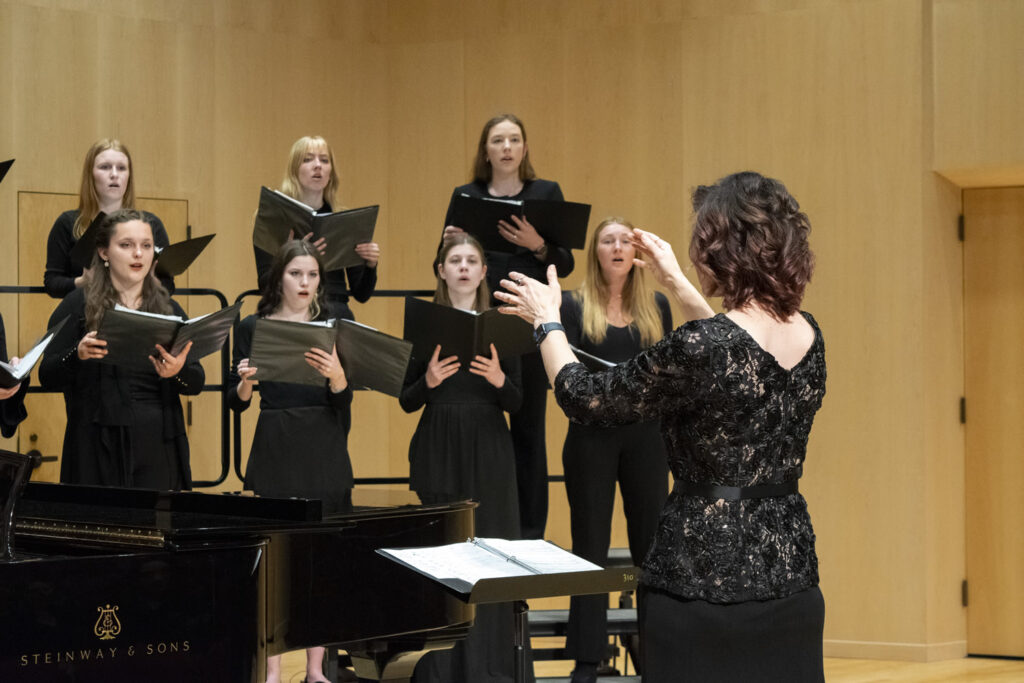
Kourtney Austin, a UW-La Crosse assistant professor of Music pictured here conducting, studied speech pathology and voice science at the University of Iowa and is a certified vocologist. She previously used this expertise in her own business, Heartland Healthy Voices. (Photo credit: Dakota Kallas)
In the realm of sports, it’s common to see athletes surrounded by a team of health specialists, from physical therapists to athletic trainers, ensuring they stay in peak condition. However, when it comes to musicians, such support is often lacking.
Kourtney Austin, an assistant professor of Music at UW-La Crosse, is striving to change that. “Musicians are getting injured much in the same manner as athletes,” Austin says. “Yet, the physical health of musicians often goes unaddressed.”
Austin’s research focuses on performing arts health, a field that began to gain traction in the 1990s. A singer and instructor herself, Austin is pushing the boundaries of this field beyond traditional vocal remedies like drinking water. Her work addresses preventing hearing loss, preserving musculoskeletal health, and enhancing mental well-being, with a special emphasis on singers.
“As singers we don’t get to put our instrument away safely in a case at the end of the day where it can’t be damaged or broken,” Austin explains. “Everything we do as human beings can affect a singer’s health.”
She highlights that one in five young people have already experienced noise-induced hearing loss, an issue that can severely impact singers who rely on their hearing to stay on pitch. This loss is preventable, yet many are unaware of the risks posed by frequent exposure to loud sounds, whether from concerts, cheering crowds, or even lawn mowers.

Kourtney Austin’s research focuses on performing arts health. “Musicians are getting injured much in the same manner as athletes,” Austin says. “Yet, the physical health of musicians often goes unaddressed.” (Photo courtesy of Austin)
Musculoskeletal health is another crucial aspect of Austin’s research. Conditions like carpal tunnel syndrome (CTS), often resulting from repetitive strain such as holding a heavy music folder while singing, and issues like Temporomandibular joint (TMJ) pain, can significantly affect a musician’s performance. Habitual movements, like locking knees or slouching, also add to these problems.
Austin’s research also delves into mental health. Performance anxiety is a common issue among young singers, impacting not just their performances but their overall well-being.
To put her research into practice, Austin implemented a 10-week curriculum for the UWL Treble Chorus during the fall 2023 semester. Each day of rehearsal students received brief, focused lessons on performance health. Surveys conducted before and after the curriculum revealed that the students found the program highly beneficial.
Austin recently shared her research at the Performing Arts Medicine Association meeting in London, thanks to a UWL International Scholarship grant.
“Faculty sharing their research at international conferences is invaluable as it fosters global collaboration, enhances the dissemination of knowledge, and drives innovation,” says UWL Director of International Education & Engagement Karolyn Bald. “Additionally, students gain inspiration from their professors’ experiences, which can guide their research and career paths.”
Austin hopes to see similar educational initiatives adopted in other choral programs.
“The UK has some wonderful initiatives focusing on performing arts health,” Austin observes. “The Performing Arts Medicine Association includes a diverse group of experts from physicians to musicians coming together for musicians’ benefit, and the professionals there were very receptive to my contributions.”
Austin says that even brief, targeted lessons can significantly boost singers’ awareness and skills in maintaining their health. “You don’t need a degree in performing arts health to share this knowledge,” she says.
The Performing Arts Medicine Association offers numerous resources for those interested in learning more about this field.
Austin emphasizes that just as other professions face specific risks, so do performing artists. “It’s time we take musicians’ health seriously,” she notes. “If we’re injured, we don’t work, and we can’t make a living. We are occupation just as worthy of a safe working environment as a football player, doctor or lawyer.”
Written by UW-La Crosse University Marketing & Communications
Link to original story: https://www.uwlax.edu/news/posts/sound-advice/
